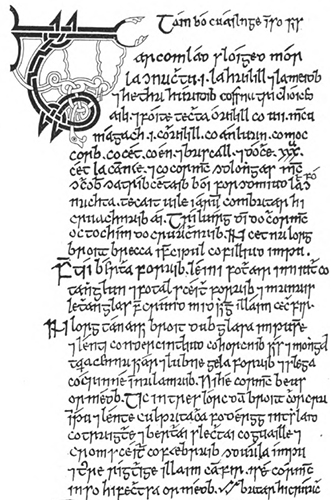After Greek and Latin, Irish has the oldest literature in Europe, and Irish is the official language of the Republic of Ireland.[1] The prose epic Táin Bó Cúalnge (The Cattle Raid of Cooley) narrates the battles of Irish legendary hero Cúchulainn as he single-handedly guards a prize bull from abduction by Queen Medb and her Connacht army. The tale is the most important in the broader mythology of the Ulster Cycle. The versions we know survive in fragments from medieval manuscripts (notably Lebor na hUidre, the oldest existing text in Irish, the Yellow Book of Lecan, and the Book of Leinster), but the story itself is most likely part of a pre-Christian oral tradition.
In the story, Queen Medb seeks to match her husband Ailill’s wealth through the acquisition of a bull, and she resorts to a raid after her attempt at trade falls through. Inconveniently, all the men in Ulster who might defend the bull have been cursed ill. Cúchulainn, the only man left standing, challenges warriors in Medb’s army to a series of one-on-one combats that culminates in a tragic three-day fight with his foster-brother and friend, Ferdiad. Along the way, Cúchulainn meets his father, the supernatural being Lugh; enjoys supernatural medical care; and transforms into a monster during his battle rages. After Ferdiad’s death, the Ulster men rally and bring the battle to a triumphant finish. Medb’s army is sent packing, but not before she succeeds in smuggling out the bull.
During the early 20th century, the Táin inspired Irish poets and writers such as Lady Gregory and William Butler Yeats, while Cúchulainn served as a symbol for Irish revolutionaries and Unionists alike. The Táin and its legends are routinely taught in UC Berkeley courses such as Medieval Celtic Culture, Celtic Mythology and Oral Tradition, and The World of the Celts. In 1911, the first North American degree-granting program in Celtic Languages and Literatures was founded at Berkeley, and the Celtic Studies Program continues to thrive today. Faculty from the departments of English, Rhetoric, Linguistics, and History participate in teaching regular courses in Irish and Welsh language and literature (in all their historical phases), and in the history, mythology, and cultures of the Celtic world. Breton is also offered regularly, and Gaulish, Cornish, Manx, and Scots Gaelic are foreseen as occasional offerings.[1]
Contribution by Stacy Reardon
Literatures and Digital Humanities Librarian, Doe Library
Sources consulted:
- Celtic Studies Program, UC Berkeley (accessed 1/27/20)
~~~~~~~~~~
Title: “Táin Bó Cúalnge” in Leabhar na h-Uidhri
Title in English: Leabhar na h-uidhri: a collection of pieces in prose and verse, in the Irish language, comp. and transcribed about A.D. 1100, by Moelmuiri Mac Ceileachair: now for the first time pub. from the original in the library of the Royal Irish academy, with an account of the manuscript, a description of its contents, and an index.
Author: Anonymous prose epic
Imprint: Dublin, Royal Irish academy house, 1870.
Edition: 1st edition facsimile from original 8th century manuscript
Language: Old/Middle Irish
Language Family: Indo-European, Celtic
Source: HathiTrust Digital Library (Cornell University)
URL: https://catalog.hathitrust.org/Record/001058698
Other online editions:
- Táin Bó Cúalnge from the Book of Leinster, Corpus of Electronic Texts (CELT).
https://celt.ucc.ie/published/G301035/index.html
Select print editions at Berkeley:
- Fragments of the Táin in Atkinson, Robert. The Yellow Book of Lecan: A Collection of Pieces (prose and Verse) in the Irish Language, in Part Compiled at the End of the Fourteenth Century : Now for the First Time Published from the Original Manuscript in the Library of Trinity College. Dublin: Royal Irish Academy, 1896.
- Recension of the Táin in Atkinson, Robert. The Book of Leinster, Sometime Called the Book of Glendalough: A Collection of Pieces (prose and Verse) in the Irish Language : Compiled in Part About the Middle of the Twelfth Century. Dublin: Royal Irish Academy, 1880.
- The Táin. English translation by Thomas Kinsella and brush drawings by Louis Le Brocquy. Philadelphia: University of Pennsylvania Press, 1985.
- The Táin: A New Translation of the Táin Bó Cúailnge. English translation by Ciaran Carson. New York: Viking, 2008.
- Táin Bó Cúalnge, from the Book of Leinster. Annotated English edition by Cecile O’Rahilly. Dublin: Dublin Institute for Advanced Studies, 1967.
The Languages of Berkeley is a dynamic online sequential exhibition celebrating the diversity of languages that have advanced research, teaching and learning at the University of California, Berkeley. It is made possible with support from the UC Berkeley Library and is co-sponsored by the Berkeley Language Center (BLC).
Follow The Languages of Berkeley!
Subscribe by email
Contact/Feedback
ucblib.link/languages

![The Languages of Berkeley [fan]](https://update.lib.berkeley.edu/wp-content/uploads/2019/02/fan_languages-450px.jpg)